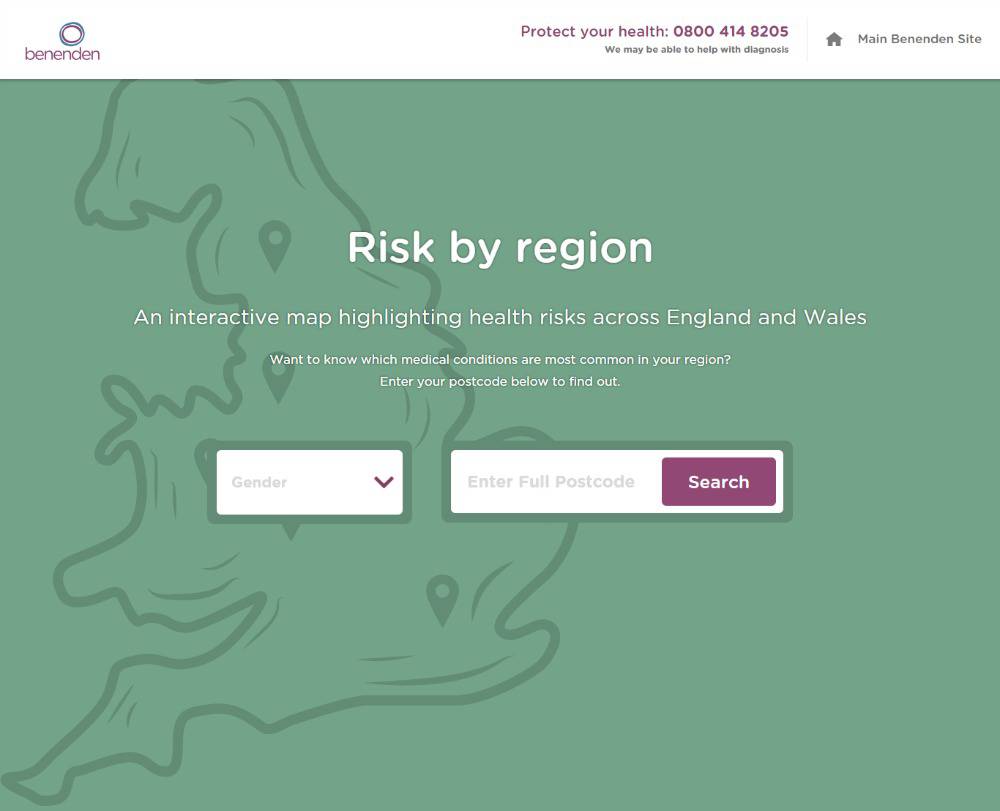We all worry about developing a serious illness in our lifetime, and we know that the risk of developing some diseases is higher for some of us, than for others – some diseases women are more likely to get for example, or those of a certain age can have a higher chance of getting an illness. But have you ever thought about whether your chances of developing a health condition could be affected by where you live?

Benenden – a health & wellbeing provider, analysed national statistics looking at the varying risks of developing medical conditions across different areas of the country and used them to develop a tool for people all over the UK to be able to check which major medical conditions are most likely within their region. National statistics show that different areas of the country have a varied risk of developing a serious medical condition when compared to the national average. It is based on occurrences per 1000 people, with statistics looking at how more or less likely you are to potentially develop a serious medical condition based on where you live.
It sounds scary, and it is a bit – but I think it’s a good idea to be informed so that we can do what we can to potentially minimise that risk, or watch out for signs of a particular illness (or move to one of the lower risk areas!). The tool is really easy to use – you just select your gender and enter your post code. Then it comes up with a list of illnesses and the risk of getting them in your area. If the average risk for England and Wales is represented by 1, a number higher than this indicates the area has a risk higher than the average, while a smaller number represents a reduced risk compared to the average. Nottinghamshire, where I live, ranks 49th out of 71 counties across England and Wales for risk of a medical condition in females, with Kidney Disease topping the list. It is interesting to have a look at, I think, and hopefully it will only be used positively, so for example if a woman saw that her area was more at risk from breast cancer – she would be more likely to check her breasts. Obviously we should all do that anyway, but that doesn’t mean that we do.

The ‘Risk by Region’ tool is designed to raise people’s awareness of the higher risk medical conditions in their area so they can take a more informed view of their approach to health and lifestyle. It does not make assumptions on your current lifestyle – instead it uses national statistics to build the picture of varied risk across the country.
The tool also allows users to understand the regional differences between the sexes. If you are a woman, you are 21% more likely to be at risk of breast cancer if you live in Cheshire compared to women who live in Cambridgeshire. And if you are female in Cornwall you are 14% less likely suffer from heart disease than a woman in Merseyside.
Those who live in the areas of East Sussex and Suffolk are 7% less likely (compared to the national average) to develop a serious condition like cancer or liver disease. Hertfordshire, Rutland, Lincolnshire, Cumbria, Norfolk, Shropshire, Worcestershire and West Sussex are the other areas with the lowest risk of disease. Whilst those living in Hampshire are 12 per cent more likely to develop a serious medical condition.
Dr John Giles from Benenden said: “National statistics show that different areas of the country have a varied risk of developing a serious medical condition when compared to the national average. Whilst statistics do not make assumptions on any influencing lifestyle factors, it’s nonetheless interesting to note variances as high as East Sussex at 6.69% less than the national average. Hampshire, perhaps surprisingly, comes out at the top of the higher risk regions and this could be linked to a variety of factors, including the average age of the population.”
I think it’s an interesting tool to use to have a look at the area in which you live and show’s how important it is to take responsibility for our own health. It is also useful in helping those responsible for organising healthcare for their local region to plan care locally. Obviously we shouldn’t take it as read though, and panic about having a slightly higher risk of developing a serious illness. It is just that, a tool.
The Benenden tool does not constitute medical advice and anyone experiencing symptoms should contact their GP.
In association with Benenden.